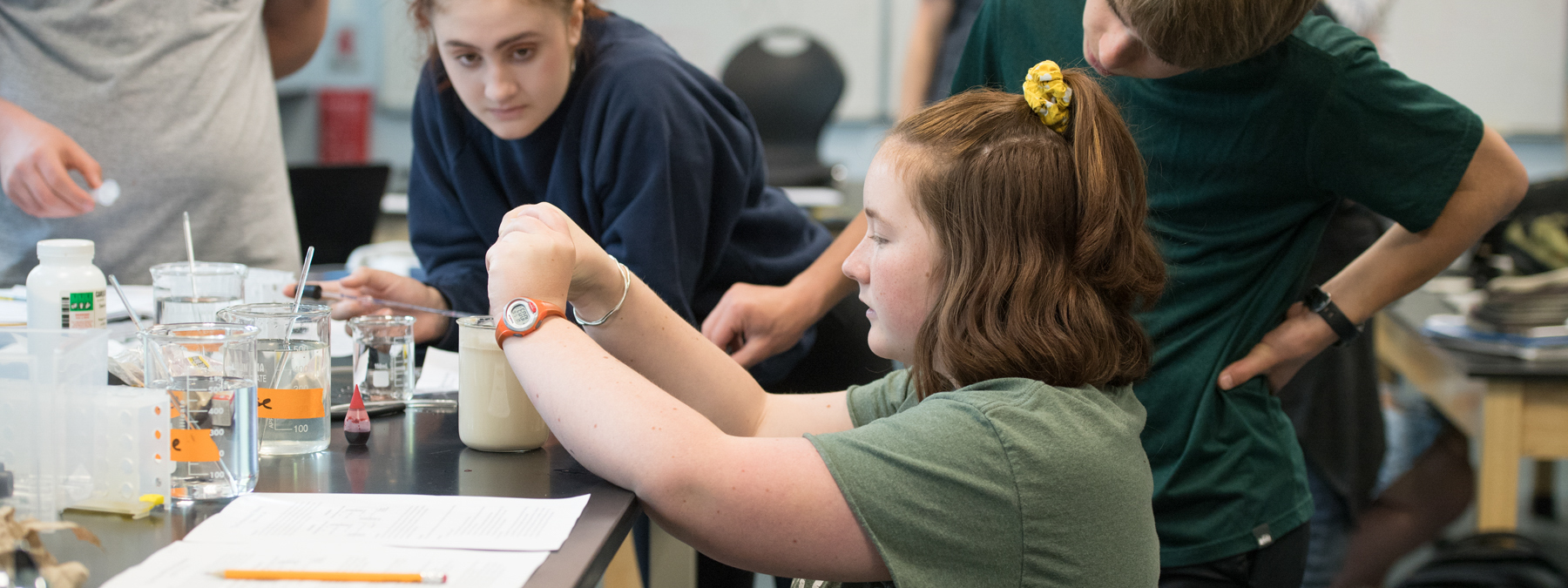We are continuing to redesign our graduation requirements in terms of a student’s skills and proficiencies in specific academic areas, rather than in traditional terms of “seat time” in class. Each department has articulated the skills and content particular to that discipline. Below is a series of footprint videos which focus on the Sciences here at Putney. Each brief video is a glimpse of a project, activity, or challenge that Putney students navigate in the sciences as they learn the specific skills and knowledge required by the department.
Collodion Plate Photography
Skills: Utilizes the periodic table to predict patterns of reactivity and outcomes of chemical reactions. Constructs questions, investigations, and explanations about chemical processes.
Knowledge: Considers physical, chemical, and thermodynamic conditions affecting experimental data and uses them to inform investigative methods. Constructs novel methods utilizing known protocols.
Design & Construction of a Telescope Mount & Observatory
Skills: Constructs a framework of methods, using appropriate tools and protocols.
Engineering & fabrication of a Robotic Arm
Skills: Demonstrates fluency with findings and the larger scientific implications. Depth, distillation of research, and visual presentation are of a professional quality.
Knowledge: Identifies basic energy input-output relationships and transformations of various forms (chemical, mechanical, electrical).
Force Vector Table
Skills: Constructs a framework of methods, using appropriate tools and protocols.
Knowledge: Identifies the presence of a net force. Uses concepts of momentum and impulse. Recognizes that force and momentum are vector quantities.
Forest Ecology with Tom Wessels
Skills: Collects and records complete qualitative and quantitative data. Follows instructions for use of data collection tools.
Knowledge: Offers examples of species’ adaptations, including co-evolution. Models trophic pyramids and webs, including keystone species. Offers examples of the impacts of human activities on the environment and biodiversity.
Managerial Styles & Scientific Collaboration
Skills: Works willingly and effectively with others; Understands what strengths and weaknesses a particular group offers, works toward capitalizing/mitigating those.
Milk Microorganism Lab
Skills: Forms a relevant central question based on previously constructed knowledge; Identifies all variables before beginning an experiment. Controls appropriately for potential confounders by developing effective methods; Generates hypotheses that are supported by foundational knowledge. Modifies hypotheses over time as data emerge; Identifies all variables before beginning an experiment. Controls appropriately for potential confounders by developing effective methods; Develops and writes methods so that a person of similar training could reproduce the experiment. Uses a microscope effectively.
Knowledge: Articulates how errors in transcription and translation can result in organismal dysfunction. Considers physical, chemical, and thermodynamic conditions affecting experimental data and uses them to inform investigative methods.
Representing Global Consumption in Printed Displays
Skills: Presents all elements of an investigation and is able to answer surface questions from peers. Supports presentation with an effectively formatted visual display. Offers rudimentary feedback to peers.
Knowledge: Models ecosystem dynamics, predicting outcomes if a particular species or population were to be altered. Produces plausible hypotheses regarding outcomes of human manipulation of the natural environment. Creates or revises a simulation designed to mitigate adverse impacts of human activity on biodiversity.
Slime Mold Lab
Skills: Forms a relevant central question based on previously constructed knowledge; Generates hypotheses that are supported by foundational knowledge. Modifies hypotheses over time as data emerge; Identifies all variables before beginning an experiment. Controls appropriately for potential confounders by developing effective methods; Develops and writes methods so that a person of similar training could reproduce the experiment.
Knowledge: Develops a model or experiment to illustrate the concepts of photosynthesis, cellular respiration, energy transfer and storage in a cell; Explains unity and diversity among living things, using an evolutionary context.


